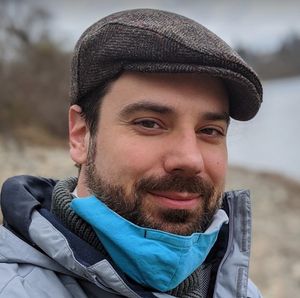GTU Alum Dr. Bill Zangeneh-Lester Speaks at U.S. Department of Education Conference
BERKELEY, CA – August 14, 2023 – Dr. Bill Zangeneh-Lester (PhD, GTU ’21) recently participated as a featured speaker at a conference hosted by the U.S. Department of Education’s Center for Faith-based and Neighborhood Partnerships (CFBNP), titled “Free to Learn: Inclusion & Accommodations for Students of All Faiths & None.”
The July 18th conference, which was the first of its kind hosted by the Department of Education, brought together educators, inclusion professionals, and community stakeholders committed to fostering inclusive learning environments for students of diverse religious and nonreligious backgrounds, from pre-kindergarten through college.
The CFBNP is overseen by White House Office of Faith-based and Neighborhood Partnerships, which coordinates the President’s Advisory Council of the same name. This Advisory Council was established in 2009 by President Barack Obama to make recommendations on how the federal government can more effectively partner with faith-based and neighborhood organizations.
Representatives from the U.S. government, including Secretary of Education Dr. Miguel Cardona, Assistant Attorney General Kristen Clarke, and Congressman Jamaal Bowman (NY-16), addressed attendees in the opening plenary, which focused on creating inclusive school cultures. Subsequent panels and sessions focused on topics such as religious inclusion and accommodations in pre-K-12 schools and on campuses of higher education; Antisemitism and the experiences of Jewish students; Islamophobia and the experiences of Muslim students; initiatives from the Biden-Harris Administration to advance equity, civil rights, and equal opportunity; and more.
Dr. Zangeneh-Lester's work for the last 14 years has focused on teaching community college students — the most diverse higher education institutions in California — educating them about American religious diversity and providing them with opportunities for constructive civic engagement. Currently, he is Professor and Chair of the Department of Humanities and Religious Studies, at American River College (ARC), where he has worked for eight years.
“My diverse community college students disagree about many things but are in near universal agreement about this: There is an urgent need to educate about twenty-first century American religious diversity and to provide religiously diverse students with opportunities for constructive civic engagement,” Dr. Zangeneh-Lester said. “Continuing to ignore America’s growing religious diversity does nothing to prepare students and educators to become civically engaged, informed, and mutually responsible citizens in today’s religiously diverse democracy. This is a constitutional imperative that is often overlooked in public life. As the Department of Justice’s Assistant Attorney General Kristen Clarke reminded leaders at the conference, 'There are no second-class faiths under the First Amendment.'”
On ARC’s campus, Dr. Zangeneh-Lester has helped to re-establish the Muslim Student Association, create the Meditation and Reflection Space — a safe, non-denominational setting where anyone can reserve a room to pray or meditate — and facilitate a number of public events aimed at generating interfaith dialogue, such as “A Bigger Table: What Abraham Can Teach Us About Hospitality,” which featured GTU scholars along with leaders from local Jewish, Christian, and Muslim communities.
“An interfaith movement is emerging from our diversity, equity, and inclusion commitments at ARC to ensure that students are safe, supported, and valued as their whole selves. My hope is that this movement bridges community college campuses and the diverse communities they serve by creating new opportunities for civic engagement that work toward a more inclusive, more informed, and more just society,” Dr. Zangeneh-Lester said. “If that vision sounds familiar to you, it is because I encountered it at the GTU.”
During his time at the GTU, Dr. Zangeneh-Lester's research focused on what this interfaith movement, borne out of community college campuses might look like, culminating in his dissertation entitled, “Strength Overlooked: Toward Anti-Hegemonic Pluralism and a Community College Interfaith Movement.”
In reflecting on his GTU experience, Dr. Zangeneh-Lester spoke about the impact of feeling directly connected to the scholarship and the living tradition thanks to the tremendous network of scholars on Holy Hill, as well as the inspiring model of religious diversity as a strength, rather than a destructive force.
“The guidance, support, and education that I received at the GTU have not only informed my work with my religiously diverse community college students, but I believe also made the opportunity to participate in this conference possible,” Dr. Zangeneh-Lester said. “These experiences leave me with the hope that leaders will respond to renewed calls by the DOE and DOJ for inclusion across lines of religious difference on civic grounds. What would it look like if every student were given an equal chance to succeed and to show up as fully accepted members of society? It would look like a community college—at least, that is my aspiration as a community college educator after completing my education at the GTU.”

